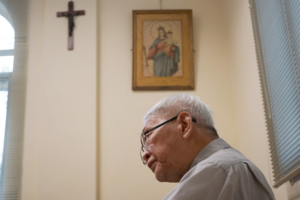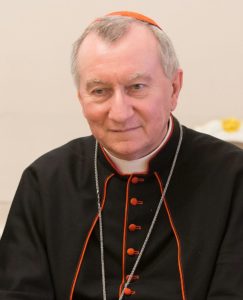
The New York Times has published an extended critique by Cardinal Joseph Zen Ze-Kiun (陳日君—Mandarin pronunciation: Chen Rijun), Bishop Emeritus of Hong Kong, of the September provisional agreement between the Vatican and Beijing, whereby the Vatican agrees to recognize those Chinese bishops appointed by the political authorities (via the Chinese Catholic Patriotic Association), and the political authorities in turn allow the Pope a veto over the appointment of future bishops. Zen asserts that the Pope has been fooled both by the Chinese authorities and by his own bureaucracy. The Pope is an Argentine and all of his life has seen communists as the oppressed. He does not understand that when they gain power they become the oppressors. The Pope desires that the official and underground communities in China come together again, but the consequence will be “the annihilation of the real church in China.” “If I were a cartoonist,” Zen says, “I would draw the Holy Father on his knees offering the keys of the kingdom of heaven to President Xi Jinping and saying, ‘Please recognize me as the pope.’”
Be all that as it may, and recognizing that a few weeks are too soon to say anything definitive, there is little evidence that the Chinese authorities are prepared to make things easier for the Church as an institution or Catholics as believers. In October two Marian shrines, one in Shanxi and one in Guizhou, both pilgrimage sites for both the underground and official communities, were reported destroyed by local authorities (although some analysts take this as evidence that the agreement is meeting resistance from the Patriotic Association, despite support from the Central authorities). Previously the Chinese authorities had placed obstacles in the way of Catholics, and certainly higher clergy, who wished to visit Rome. But two Chinese bishops were delegated to attend the October 2018 Synod on Youth: Msgr. Guo Jincai, fresh from being reinstated from his excommunication, and seemingly now the regime’s choice as the public face of Chinese Catholicism; and Msgr. Yang Xiaoting, who previously had been in the underground but in 2010 gained acceptance by the authorities: perhaps he is the regime’s model of the way they would like all the underground Church to behave.
Curiously, the two prelates arrived in time for the opening of the synod, but left on October 15, two weeks before the end of the synod and prior to the major debates and votes on the synod’s report to be submitted to the pope. Perhaps they (in common with most Chinese Catholics, clerical or lay, official or unofficial) shared with the African Church a lack of interest in or sympathy for the semi-covert agenda of the synod, the recasting or at least muddying of the Church’s teaching on homosexuality, an obsession with many in the west but perhaps not much shared elsewhere. One wonders if the regime authorities had hoped that the bishops might explain to their peers why it is a good thing that Chinese youngsters are forbidden to receive a religious education or attend religious ceremonies.
Pope Benedict seems to have held Cardinal Zen in high esteem, but the new regime has treated him as a pest, a gadfly, an obstacle. He is the highest-ranking and most intransigent among those insisting that the Chinese authorities respect the Church’s traditional rules and practices, and most hostile to any role for the Patriotic Association in the governance of the Church. He previously said that if the Pope finally should make an unsatisfactory decision, he would retreat to spend the rest of his life in silent prayer. It would seem he is not quite ready for this yet.
Unlike many conservative or traditionalist Catholics in the west, Zen does not entirely repudiate the official Church. He recognizes that there are many good and sincere people in it among its members and leaders; and, indeed, at one time he taught in the Shanghai seminary at Sheshan, when the state-assigned Bishop of Shanghai, Msgr. Jin Lushan, was attempting to bring the official Church back into line, in terms of doctrine and ecclesiology, with the contemporary practice of the universal Church.
Zen would perhaps argue that in its own way the official community, both religious and lay, apart perhaps from a few professional apparatchiks in the Patriotic Association and possibly some regime sleeper agents among the clergy, are in their own way as much victims of regime repression as is the underground. They do not accept the regime discipline because they think it is correct, but because they see it as the only genuinely practical way to assure the continued presence of Catholicism in China. As much as the underground they see themselves as part of the universal Church under the authority of the Pope. After all, by the time of the provisional agreement, all but seven of the 70 or so “official” bishops had sought and received Papal ratification of their appointments (although this was done privately, not proclaimed in the streets and from the rooftops).
Zen’s problem is that he is a man of high principle, perhaps useful in times of conflict, but a nuisance when deals are to be struck. As Bishop of Hong Kong until 2009 he was as outspoken in defending that region’s autonomy under the Sino-British agreement on retrocession, and on promoting the development of democracy in that territory.
Zen has been marginalized during the Francis papacy, but, then, so have all the other ethnic Chinese clergy and lay. Among the higher-ups, the Holy Father is not the only one who knows nothing about China—those with the greatest stake in the outcome were frozen out of the negotiations. On the other hand, the Churchmen who made the agreement are not highly inclined to take seriously the reservations of those who do know about China. Some in Hong Kong have drawn the analogy between those who negotiated Hong Kong’s 1997 reversion to Chinese sovereignty: the Hong Kong public was not consulted on that deal, and Chinese Catholics have not been consulted on this one.
The agreement cannot be dismissed as entirely indefensible. Certainly a proper reconciliation of the two Chinese communities would be nothing but desirable. There are no longer any differences of doctrine between them, whether in theology or ecclesiology. The division is a matter of faction and family tradition, combined with differences of prudential and political judgment; and at the parish, grass-roots level, the difference is often irrelevant or muddied over. The official community may find the underground irresponsible, and the underground may find the juring Catholics opportunistic and unprincipled. There is no abstract disagreement on how things ought to be, were the world as the world should be.
Zen himself tacitly acknowledges some possible benefits from the agreement. He admits that the Pope now has the “last word” on episcopal appointments: no bishops (supposedly) will be ordained without papal approval, but pooh-poohs the significance of this: “In theory the pope could veto the nomination of any bishop who seems unworthy. But how many times can he do this, really?” Well, that remains to be seen. Zen may even make the agreement out to be more favorable to the Church than we can currently assert. He says that the 30-some remaining underground bishops will now be recognized by the state. He pooh-poohs this, too: “But will the 30 then be allowed to still function as underground bishops? Surely not.” But if in fact everyone is accepted both by the state and by the Pope, then what need is there for an underground? But the real reservation is that there is no evidence, not even a hint, that the regime has committed to recognize the jurisdiction of the underground bishops. Indeed, in early November Shao Zhumin, underground bishop of Wenzhou (in Zhejiang province), was taken away to undergo two weeks’ of “re-education.”
Yet it must be admitted, however reluctantly, that if the position of the Catholic Church is going to be somehow “normalized,” the Vatican is going to have to deal with the regime authorities and, through them, with the official community. This is in spite of the underground’s staunch loyalty to the Vatican in the face of persecution, while the position of the official community has been at best equivocal. Pope John Paul II, shortly after assuming office, declared Gong Pinmei, Bishop of Shanghai imprisoned since 1955, a Cardinal “in pectore” (“in his chest”—that is, secretly). John Paul (presumably—it possibly could have been Paul VI or John Paul I) also gave the underground community a special dispensation allowing it to ordain new bishops without prior consultation with Rome (meaning the underground was given the authority to do what the “patriots” were condemned for arrogating to themselves that particular authority). Since then, though, the underground has been ignored or treated cavalierly, with all effort directed toward cultivating the official Church. There is reason for the choice: the official Church controls the resources and the educational institutions, and some among the underground clergy are less well-educated (and in some cases perhaps less well-behaved) than is proper. Pope Benedict cancelled the particular authority enjoyed by the underground in episcopal appointments in 2007, basically taking away what leverage the underground had against the regime. In spite of its neglect by Rome, the underground is not a negligible thing: it probably has a slightly larger membership than the official community. The Vatican calculation behind the agreement was, probably, that because the underground is just that because of its consistent loyalty to the Pope, it will simply go along with whatever the Pope decides. Cardinal Zen is not so sure.
Zen says that the “Vatican’s deal, struck in the name of unifying the Church . . . means the annihilation of the real Church in China.” It is not obvious what he means by the “real Church,” against which the gates of hell will not prevail (but, of course, they may prevail in certain times and places). The underground is probably demoralized, and the ordinary believers in the official community probably conflicted. Whatever their quarrels with the underground, its existence did at least a minimum to keep the arrogance of the authorities in check. A perception that the leadership of the universal Church that is as weak and compliant as the leadership of the official Church in China cannot be morale booster.
Zen’s public line on the Pope heretofore was that the Holy Father is a good, well-meaning man who is being manipulated by his underlings, especially the ambitious Secretary of State, Pietro Cardinal Parolin.

(Il miglior fabbro)
Zen still blames Parolin, but is also, one gathers, disillusioned with the Pope. Zen had personally spoken with the Pope a few days before the agreement was announced, to ask him not to do it. He was given a few gently reassuring words that were later seen to be pure equivocation.
The China agreement is consistent with much of the rest of Church policy under Francis. Francis’s admirers hail him as a revolutionary figure, determined to bring about a fundamental reform of the Church. But part of the way of approaching this, seemingly, has been to downplay the classical teachings, practices, and functions of the Church in favor of pronouncements in agreement with the dominant secular moral concerns: global warming, migration, the benevolence of Islam, plastic straws, that sort of thing. The result, however, seems to be that the conventionally pious are confused and hurt; the secular world, for its part, is willing to indulge the Pope for what use to it he may be, but does not seem to be running back to the bosom of the Church.
Some Catholics of a traditionalist strain, at least in the United States, are even prone to regarding Pope Bergoglio as the anti-Christ. This may give him too much credit. It is more likely that he is, as Cardinal Zen says, a well-meaning man, albeit one with grave defects of intellect, character, and temperament, in an impossible position. From his too frequent public statements it appears that anything that comes into his head immediately has to come out of his mouth, and much of this is completely in accord with Church tradition and conventional piety. He has spoken movingly about the evils of abortion, the value of a stable family life, the corrosiveness of worldly ambition, on and on and on. But he shows little sense of how one thing connects to another, and these are not the statements that the World (and perhaps the various cabals around him) choose to emphasize.
The Pope likes to attribute the ills in the Church to “clericalism,” a vague term that avoids going into the details of the specific ways this supposed clericalism actually works its harm. One grave, perennial source of corruption has been the curia, the Vatican’s “deep state,” as it were. It is thought that an inability to cut through the curial corruption was one of the reasons for Pope Benedict’s resignation, and the expectation was that Francis, an outsider, would be in a better position to deal with it. Some of those who study the arcana of Church politics, however, have concluded that by this point the curia has gained control over the Pope and his agenda, with Cardinal Parolin emerging as the power behind the throne.
Parolin as much as Francis has been pushing for the démarche with China. Given the highly problematic nature of the terms on which any formal agreement would be possible, the intensified religious persecutions inside China, and the renewed attention to pervasive sexual scandals in the Church, it seems reasonable to have expected that the China diplomacy would be put on hold—especially since Parolin himself was in the soup, with accusations that he was marginally involved in the cover-up of the scandals. But an equally plausible expectation would be that the clerical powers would push ahead, taking attention away from the scandals with t a Nixon-Kissinger triumph, a grand reconciliation.
At any rate, we may surmise that Cardinal Parolin is one skilled at avoiding the transverse scales.Cardinal Zen, to the cost of his political efficacy but, one hopes, to the benefit of his soul, is not.
